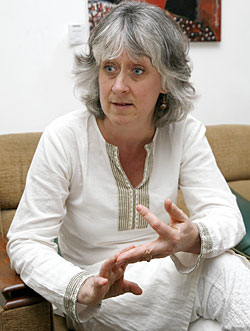 |
Nepali Times: How does the ILO combat forced labour globally?
Caroline O'Reilly: One of the basic principles of the ILO is that all people should work in conditions of freedom and human dignity. No one should be forced to work against their will, but the ILO estimates that there are at least 12.3 million people trapped in forced labour today. Almost all our member states have ratified the ILO convention that prohibits forced labour, so we work with them to fulfil this. This may involve capacity building of partners in different countries, mainly the ministries of labour, trade unions, and employers. We need good laws in place not only to stop forced labour, but also to help victims get their wages, protective services and so on.
But trade unions in Nepal have become very politically oriented, and are considered a nuisance by many.
Trade unions represent the interests of their members but also reach out to other people. That is particularly helpful for those in forced labour, which doesn't tend to happen to people in the organised sector. Frankly, it is happening in the informal economy, people who are working in agriculture, in construction, but who are not part of the organised work force. Trade unions can raise their awareness about what their rights are and also offer legal assistance and advice.
We do work with trade unions here in Nepal, particularly in protecting the rights of migrant workers, who might find themselves in exploitative situations abroad. We also assist the ministry of labour and the department of foreign employment in revising the rules and regulations concerning foreign employment. We are working with recruitment agencies to help them adopt and put into practice a code of conduct.
Is there a link between migrant workers and human trafficking?
Absolutely, especially when migrant workers don't go through official channels, they are vulnerable to forced labour. Many people think trafficking is just about the movement of women and girls to be exploited in the sex industry, but it can happen to anyone, man woman, girl or boy for any sort of purpose, not just for sex, but also for work in agriculture, construction, or domestic service. Forced labour actually is what happens after trafficking.
In Nepal 75 per cent of migrant workers are unskilled. What needs to be done to protect them?
We cannot prevent people from leaving but we can help them to improve their skills so that they can get better paid jobs abroad and within the country. If people can find good work at home they will not feel obliged to leave their family and move thousands of miles away.
But we also have to look at what happens in the destination country. The ILO works closely with labour inspectors charged with inspecting workplaces; they need to know how to identify victims of forced labour and how to respond to it. The issue is not high on their agenda, but we try to increase awareness about the risks and problems faced by migrant workers among labour administrations. For example, we are about to conduct training in Jordan for labour attach�s from Nepali and other south Asian countries so they can recognise problems and provide help and protection to those vulnerable workers who need it most.
READ ALSO:
Credit where it's due
Mission impossible, PRASHANT JHA


